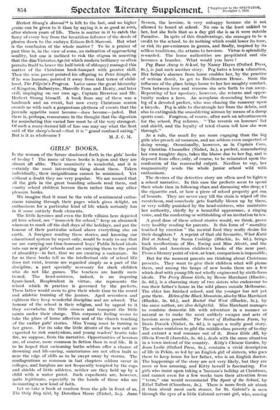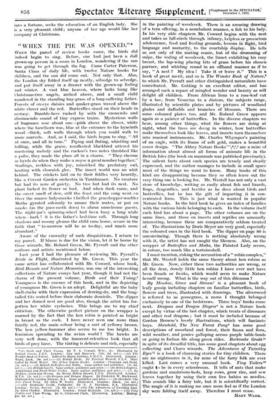GIRLS' BOOKS.
Is the woman of the future shadowed forth in the girls' books of to-day ? The name of these books is legion and they are almost all alike. Their unanimity is wonderful, and it is certainly the most interesting thing about them. Taken individually, their insignificance cannot be minimized. Yet without a doubt they are very popular. We are assured that all the girls in the great boarding schools read them, and county school children borrow them rather than any other pleasure books.
We imagine that it must be the vein of sentimental enthu- siasm running through their pages which gives delight, an enthusiasm for a particular kind of life which certainly has in it some entirely fresh elements.
The little heroines and even the little villains here depicted all love school, are " homesick for school," keep an almanack whereon to mark off the dull days of the holidays, and put the honour of their particular school above everything else on earth. A foreigner reading these stories, and knowing our educational system by report only, would be ready to say that we are carrying our time-honoured boys' Public School ideals into our new girls' schools and are carrying them to the point of absurdity—in fact, that we are creating a caricature. So far as these books tell us the intellectual side of school life does not exist, lessons are regarded simply as a part of the discipline, a part specially necessary for slack children who do not like games. The teachers are hardly men- tioned. The head-mistress, indeed, is an imposing figure-head. Resplendent in virtue, she represents the school which in practice is governed by the prefects. These latter would seem to give their whole time to the moral and athletic training of the juniors. Aged seventeen and eighteen they keep wonderful discipline and are adored. The honour of the school is their religion, and by appeal to it they overwhelm the little sinners and transport the little saints under their charge. This corporate feeling seems to take the place of home affection and of the church teaching of the earlier girls' stories. Miss Young must be turning in her grave. For its sake the little devotes of the new cult are expected to risk martyrdom, and young readers' hearts take fire, we suppose, from the narrative. Opportunities of heroism are, of course, more common in fiction than in real life. It is to be hoped that swimming baths seldom offer a chance of drowning and life-saving, sanatoriums are not often built so near the edge of cliffs as to be swept away by storms. The conflagrations so common in last chapters seldom occur in colleges, and burglars are not frequently tempted by the cups and shields of little athletes, neither are they held up by a child with a water pistol. Such expedients are, however, quite legitimate, especially in the hands of those who are insinuating a new kind of faith.
Let us take a book at random from the pile in front of us, The Only Day Girl, by Dorothea Moore (Nisbet, 5s.). Anne
Severn, the heroine, is very unhappy because she is not allowed to board at school. No one is the least unkind to her, but she feels that as a day girl she is as it were outside Paradise. In spite of this disadvantage, she manages to be a credit to the school, to do nothing which could lower its tone, or risk its pre-eminence in games, and finally, inspired by its selfless traditions, she attains to heroism. Virtue is splendidly rewarded. The home authorities are propitiated and she becomes a boarder. What would you have !
Peg Runs Away to School, by Nancy Hayes (Oxford Press, 6s.), is just such another story. Peg hates a holm* education. Her father's absence from home enables her, by the practice of serious deceit, to get to Reedhurzon House. Soon the influence of the place brings home to her her naughty conduct. Torn between love and remorse she sets forth to run away. Repenting of her apostacy, however, she returns and oppor- tunity makes a hero. An aeroplane descending breaks the leg of a devoted prefect, who was chasing the runaway upon- a bicycle. Peg is able to disentangle her from the debris, and also to extinguish the smouldering airman by means of a damp sports coat. Forgiven, of course, after such an advertisement for the school, Peg reforms. " The records on honours' list and shield, and the loyalty of tried chums tell how she won through."
As a rule, the small fry are more engaging than the big girls who preach ad nauseam, and are seldom even suspected of doing wrong. Occasionally, however, as in Captain Cara, by Christine Chaundler (Nisbet, 5s.), a prefect, remembering her own naughty days, takes the blame due to her fag, and is deposed from office, only, of course, to be reinstated upon the confession of the remorseful culprit. Needless to say, her magnanimity sends the whole junior school wild with enthusiasm.
The devices of the detective story are often used to lighten a school narrative. In this case the prefects seem to spend their whole time in following clues and discussing who drop' e 1 the cigarette end, or how a piece of school property got out of bounds. They are never easy till the stain is wiped off the escutcheon, and somebody gets fearfully blown up by them, or very mildly punished by the head-mistress, who maintains her authority, chiefly by a beautiful appearance, a ringing voice, and the conferring or withholding of an invitation to tea.
A good dose of these school stories would, we think, prove very healthy reading for parents. Is this form of " morality touched by emotion " the mental food they really desire for their daughters ? A reprint of that old favourite, What Katie Did at School, by Susan Coolidge (Blackie, Is. 6d.), brings back recollections of Mrs. Ewing and Miss Alcott, and the English and American children's books of the near past. From a literary point of view, at least, comparison is impossible.
But for the moment parents are thinking about Christmas presents. They want to give their children what will please them, and among the heaps of new books there are a few which deal with young life not wholly engineered by sixth-form ideals. The Ferry House Girls, by Bessie Merchant (Blackie, 3s. 6d.), is a charming story of two sisters who endeavour to run their father's house in the wild places outside Melbourne. The elder has finished school, and the younger has not yet gone there. Helen of the Black Mountain, also by Miss Merchant (Blackie, 3s. 6d.), and Rachel Out West (Blackie, 5s.), by the same author, are also delightful. Miss Merchant manages to combine domestic life with adventure in a manner so natural as to make the most unlikely escapes and acts of heroism seem possible. The Secret of Hallowdene Farm, by Doris Pocock (Nisbet, 3s. 6d.), is again a really good story. The writer contrives to gild the middle-class poverty of to-day and extract a real romance out of it. Brave Girls All, by Olivia Fowell (Jarrolds, 3s. 6d.), deals with the same situation in a town instead of the country. Kitty's Chinese Garden, by Joan Leslie (Oxford Press, Os.), contains a vivid description of life in Pekin, as led by an English girl of sixteen, who goes there to keep house for her father, who is an English doctor. The happenings of the story are not very likely, but they are more or less amusing, and Kitty herself is fascinating. For girls who insist upon taking a 'busman's holiday at Christmas, and cannot even for a few weeks turn their attention from " term," one would recommend The Sport of the School, by Ethel Talbot (Chambers, 8s.). There is more fresh air about it than about most such stories, for St. Gabriel's is seen through the eyes of a little Colonial servant girl, who, coming
into a fortune, seeks the education of an English lady. She is a very pleasant chili; anyone of her age would like her company at Christmas.



























































 Previous page
Previous page